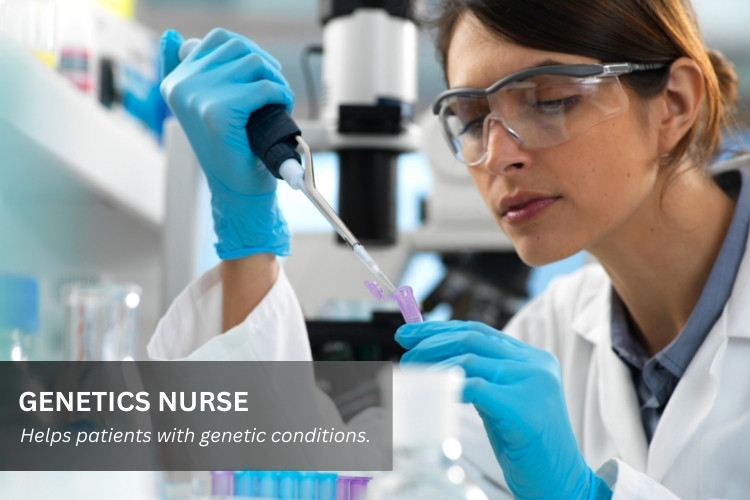Genetics Nurse
Healthcare Career Guide

Overview
What is a Genetics Nurse?
A Genetics Nurse specializes in providing care to patients with genetic disorders and those at risk of inherited conditions. These nurses work closely with genetic counselors, physicians, and researchers to assess, educate, and support patients and families affected by genetic diseases such as cystic fibrosis, Huntington's disease, sickle cell anemia, and hereditary cancers.
Genetics Nurses play a vital role in collecting patient and family medical histories, assisting with genetic testing, and interpreting results. They also educate patients about genetic risks, disease prevention, and available treatment options. In addition to patient care, Genetics Nurses contribute to research and advancements in genetic medicine.
This career requires a strong understanding of genetics, patient education skills, and the ability to guide families through complex medical decisions regarding inherited conditions.
Education
How Do I Become a Genetics Nurse?
Becoming a Genetics Nurse requires education, clinical experience, certification, and specialized training in genetics and genomics. Follow these steps to enter this challenging and rewarding healthcare career:
- Earn a Nursing Degree. Complete an Associate Degree in Nursing (ADN) or Bachelor of Science in Nursing (BSN). A BSN is preferred for specialized roles in genetics nursing.
- Pass the NCLEX-RN. Obtain your nursing license by passing the National Council Licensure Examination for Registered Nurses (NCLEX-RN).
- Gain Clinical Experience. Work as a Registered Nurse (RN) in settings such as medical-surgical units, oncology, pediatrics, or maternal-fetal medicine to build expertise in genetic-related conditions.
- Complete Genetics Training. Take courses in genetics and genomics, including programs accredited by the National Institutes of Health (NIH) or the International Society of Nurses in Genetics (ISONG).
- Obtain Certification. Earn the Advanced Genetics Nursing Certification (AGN-BC) through the American Nurses Credentialing Center (ANCC) to demonstrate expertise in genetic nursing.
Becoming a Genetics Nurse typically takes 4-6 years, including nursing school, licensure, and gaining relevant experience. Certification enhances credibility and career advancement opportunities in this field.

Average Salary
How Much Does a Genetics Nurse Make?
Salaries for Genetics Nurses vary based on location, experience, and certifications. On average, a Genetics Nurse can expect to earn between $75,000 and $100,000 annually.
Average annual salary for a Genetics Nurse:
- Entry-level: $75,000 - $85,000 per year.
- Mid-career: $85,000 - $95,000 per year.
- Experienced: $95,000 - $100,000 per year.
The U.S. Department of Labor reports that Genetics Nurses earn an average hourly wage of approximately $39.00 per hour. Assuming a 40-hour workweek, this equates to an annual salary of $81,120. The lowest 10% earn less than $33.00 per hour, while the highest 10% earn more than $47.00 per hour, resulting in an annual salary range of $68,640 to $97,760 per year.
Job Duties
What Does a Genetics Nurse Do?
Genetics Nurses provide specialized care for patients with inherited conditions and those at risk of genetic diseases. Their role involves patient education, genetic testing, and supporting families in making informed medical decisions.
The most common job duties of a Genetics Nurse:
- Conducting Genetic Risk Assessments. Collect patient and family medical histories to determine genetic risk factors.
- Assisting with Genetic Testing. Educate patients about the purpose and implications of genetic tests and assist in collecting DNA samples.
- Interpreting Test Results. Work with genetic counselors and physicians to analyze genetic data and explain results to patients.
- Providing Patient Education. Offer guidance on managing genetic conditions, preventive care, and available treatment options.
- Supporting Families. Help families understand the impact of genetic disorders and provide emotional and medical support.
- Coordinating Treatment Plans. Develop care plans tailored to patients with inherited diseases, working closely with healthcare teams.
- Advocating for Patients. Assist patients in accessing genetic counseling services, clinical trials, and support groups.
- Advanced Duties. Experienced Genetics Nurses may participate in research, develop educational programs, or influence genetic healthcare policies.
Genetics Nurses typically work in hospitals, research institutions, specialty clinics, and genetic counseling centers. Their role requires strong communication skills, medical knowledge, and an ability to help patients navigate complex genetic health issues.

Essential Skills
What Skills Does a Genetics Nurse Need?
Genetics Nurses need a combination of clinical expertise, critical thinking, and counseling skills to provide comprehensive genetic healthcare. These skills ensure they can educate, support, and advocate for patients and families facing genetic conditions.
Here are some of the skills a Genetics Nurse needs to succeed:
- Genetic Knowledge. Understand genetic conditions, risk factors, and treatment options.
- Patient Education. Clearly explain complex genetic information in an understandable way.
- Critical Thinking. Assess genetic risks and develop appropriate patient care plans.
- Communication. Provide sensitive and effective communication to patients and families dealing with genetic concerns.
- Collaboration. Work with genetic counselors, physicians, and researchers to deliver comprehensive patient care.
- Compassion and Support. Offer emotional reassurance to individuals facing genetic diagnoses.
- Ethical Decision-Making. Navigate the ethical complexities of genetic testing and patient privacy.
- Research Skills. Stay updated on advancements in genetic medicine and contribute to research efforts when applicable.
One of the challenges of being a Genetics Nurse is addressing the emotional and ethical aspects of genetic conditions. However, the role is highly rewarding, as it allows nurses to help patients make informed healthcare decisions and manage inherited diseases effectively.
Last updated: March 1, 2025
References:
- Registered Nurses. Bureau of Labor Statistics, U.S. Department of Labor. Occupational Outlook Handbook. Retrieved March 1, 2025.
- Genetics Nurse. Johnson & Johnson, Nursing Careers. Retrieved March 1, 2025.
- Genetics Nurse Education and Member Resources. National Society of Genetic Counselors. Retrieved March 1, 2025.
- Genetics Nurse Education and Member Resources. International Society of Nurses in Genetics. Retrieved March 1, 2025.
- Genetic Science Learning Center. University of Utah, Online Learning. Retrieved March 1, 2025.
- Introduction to Genomics. National Human Genome Research Institute. Retrieved March 1, 2025.
- How To Become a Genetics Nurse. Indeed, Career Guide. Retrieved March 1, 2025.
- Genetics in the clinical setting. My American Nurse. Retrieved March 1, 2025.
- How to Become a Genetics Nurse. Maryville University, Career Profile. Retrieved March 1, 2025.


